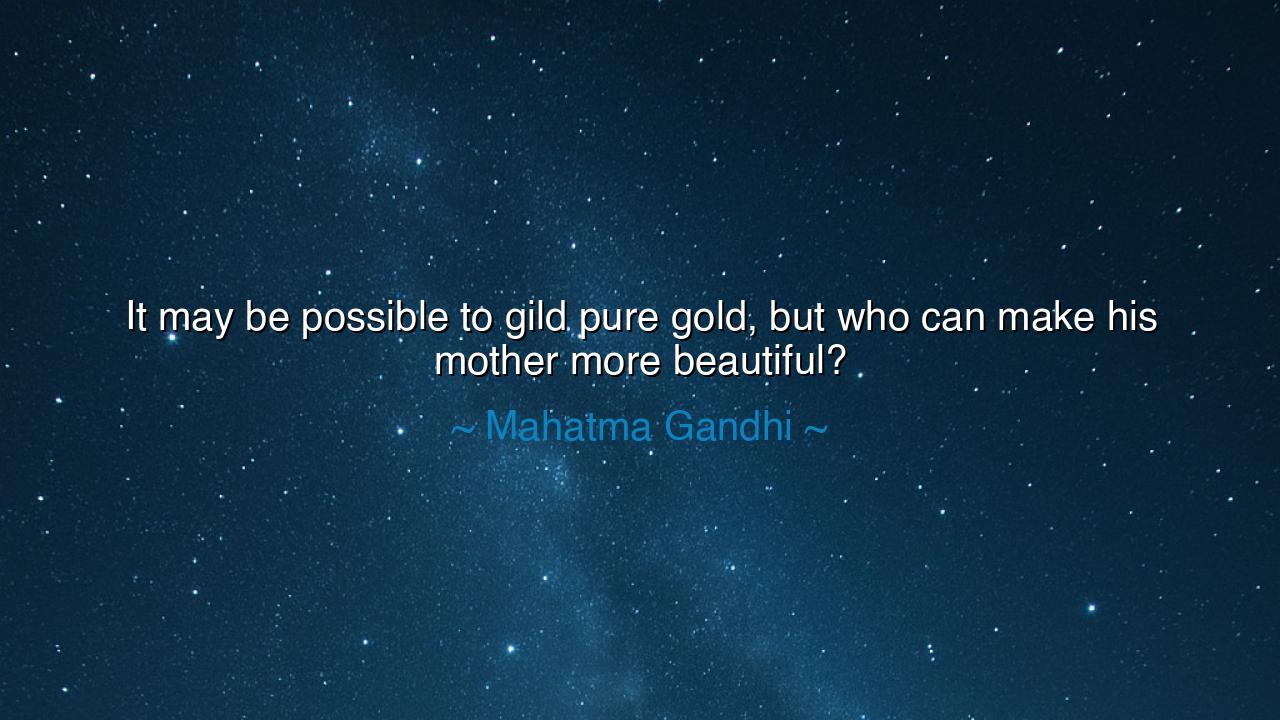
It may be possible to gild pure gold, but who can make his mother






Hear now the words of Mahatma Gandhi, the saint of India, who declared: “It may be possible to gild pure gold, but who can make his mother more beautiful?” In this simple phrase is contained a wealth of wisdom, for Gandhi was no mere speaker of idle words; he was a prophet of truth, a seeker of the eternal essence of life. In likening the mother to gold, he invokes not only purity but perfection, that which is already whole and beyond adornment. For just as no craftsman can improve upon the brilliance of the sun, so no hand can make the mother’s beauty greater than it already is.
To gild gold is to add to that which is already perfect. It is an act both unnecessary and vain. The ancients knew this truth, often repeating that perfection does not require embellishment. And what is the mother, if not the living embodiment of such perfection? Her beauty is not in garments, nor in jewels, nor in the fleeting charms of the body, but in her sacrifice, her endurance, her boundless love. This beauty is eternal, untouchable by time, unchangeable by adornment.
Consider the story of Themistocles, the great Athenian general. When asked by nobles whose banquet he attended to honor their jewels and their wives’ finery, he raised his hand to his mother and said, “This is my pride, this is my ornament.” He knew what Gandhi declared centuries later: that the mother’s beauty lies not in what can be purchased or painted, but in what is given—the shaping of character, the nurturing of life, the love that endures when all else fails.
Even Gandhi himself was the child of such strength. His own mother, Putlibai, was known for her discipline, her devotion, and her piety. She fasted often, prayed fervently, and guided her son with quiet resolve. The young Gandhi, observing her sacrifices, carried within him the image of a mother’s beauty that could never be improved, for it was already divine. It is no wonder that he later declared that no artifice could surpass what is natural in a mother’s love.
The meaning of his words is thus unveiled: human beings strive to adorn, to polish, to add beauty to what already exists. Yet in the case of the mother, such striving is folly, for her worth cannot be increased, nor her love made more radiant by any external act. The mother is the source of life, the first teacher, the first comforter, the first friend. She is already more beautiful than any crown, for her beauty lies in the very act of giving life and sustaining it.
The lesson to be taken is this: honor your mother as she is, without seeking to change or embellish her. Do not measure her beauty by worldly standards, for she transcends them all. Remember that even in her wrinkles, there is the poetry of sacrifice; in her weary hands, the history of labor; in her eyes, the light of unconditional love. To recognize this is to see with the eyes of truth.
Practical action follows easily from this wisdom. Speak words of gratitude to your mother; tell her that her sacrifices are not forgotten. Show her respect not through jewels or ornaments, but through deeds of kindness, through a life lived with integrity, which is the greatest tribute a child can offer. And if your mother is gone, remember her with reverence, honoring her by embodying the values she planted within you.
Thus Gandhi’s words stand as a torch to guide us: pure gold may be gilded, yet it remains unchanged, for it was already complete. And so it is with the mother—her beauty needs no addition, for she is already the perfection of love made flesh. To see this truth is to live in gratitude, and to live in gratitude is to walk in harmony with the eternal law of life.






AAdministratorAdministrator
Welcome, honored guests. Please leave a comment, we will respond soon